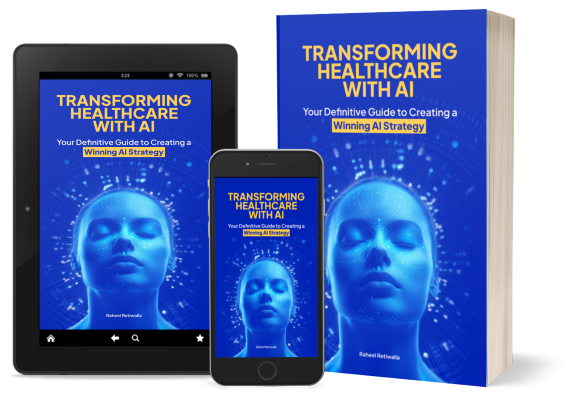During the Becker's Healthcare 14th Annual Meeting on April 9th, Productive Edge's Chief Strategy Officer, Raheel Retiwalla, sat down with Becker's Healthcare for a conversation around artificial intelligence (A) in healthcare. Listen to the complete podcast recording or continue reading the transcript of the conversation to learn more about the potential of AI in transforming healthcare, uncover some of the biggest hurdles organizations face when it comes to adoption, and how to navigate implementation complexities with confidence to reap the full potential of this transformative technology.
Becker's Healthcare: Raheel, could you start the podcast off by telling us a little bit about yourself, your journey at Productive Edge, and the role you play there?
Raheel Retiwalla: My 25-year journey in the tech industry has largely revolved around data and analytics, and I've been incredibly fortunate to have spent the last 10 years working with healthcare organizations applying analytics and AI in their businesses. My last six plus years at Productive Edge have been incredibly rewarding.
We've had the opportunity to lead multiple initiatives that bridge the gap between cutting edge technology and healthcare solutions. Our goal has really always been to enhance healthcare delivery through innovation. Focusing on making technology accessible and actionable for health care providers.
Becker's Healthcare: In what ways do you see AI reshaping health care's everyday operations, and what immediate benefits might this bring to our health care providers and their patients?
Raheel Retiwalla: AI fundamentally transforms health care by improving diagnostics, which of course, many health care providers have been using for a very long time.
But increasingly, it's about personalizing patient care and engagement, intelligently delivering healthcare services to the right patients at the right time and then optimizing operational efficiency. Though AI has been utilized broadly in healthcare, one immediate benefit is the significant enhancement in patient outcomes through predictive analytics, enabling early intervention.
And for healthcare providers, specifically, AI driven tools, streamline processes, they reduce burnout and allow more focused time on patient care. And we're seeing a significant innovation happen in that particular area. So for me, the synergy between improving provider efficiency and personalizing patient care is mainly where AI's impact is most profound and really largely exciting to be a part of.
Becker's Healthcare: Could you pinpoint some of the major hurdles healthcare organizations encounter while considering or actively going through adopting AI technologies?
Raheel Retiwalla: I think largely it starts with just understanding a strategic impact. How can I link my strategic goals to AI objectives and AI?
Sort of initiatives and how will I drive my business goals? A lot of times, it's important to step back and make sure that we're tying back any investments to a strategic impact. The other one is just the maturity of the technology. It's exciting to see the rapid pace of innovation, but we have to ask ourselves, does the underlying technology required for a particular use case that I'm envisioning actually exist? Has it been proven, and in real world applications? And then lastly, I would say it's really about understanding whatever that use case is in the technology is going to integrate that into my existing systems and technology infrastructure and my workflows, and can that actually happen with the change management to make sure that the people that are involved in the process are able to successfully benefit from the application.
Becker's Healthcare: How does Productive Edge help providers navigate these complexities to harness AI's full potential?
Raheel Retiwalla: From a Productive Edge perspective, we distinguish ourselves by focusing largely on acceleration. Our goal working with healthcare providers is to get them from concept to solution faster and more effectively. And to do so, we've actually created what we call Solution Accelerators, which are a dynamic mix of starter AI technology, our strategy accelerators, and our select best-in-class partner technologies, all of which have been designed to deliver specific impactful outcomes rapidly.
So, we start with focusing on very specific areas. We know that many organizations are struggling from areas like improving member experience, removing inefficiencies to reduce costs and the administrative burden, and improving care management. Our solution accelerators are laser-focused on helping our clients rapidly create the right solutions to address those challenges and do so in a way that meets them where they are, ensuring that these are scalable, that they'll actually drive value, and are strategically created in a way that can lift the organization's maturity as a whole in the adoption of AI.
Becker's Healthcare: What strategies do you recommend health organizations adopt to overcome these challenges? How can they not just adapt but also lead in the next wave of AI innovation in health care?
Raheel Retiwalla: I'll do a shameless plug of my recently released book called Transforming Healthcare With AI: Your Definitive Guide for Creating a Winning AI Strategy which really addresses this exact question that you asked. If you think about AI and think of it as a strategic initiative within your organization, I think it should start by really focusing on use cases, understanding which use cases should I go after first and why.
And to do so, one of the ways I talk to clients about thinking about use cases is thinking about what is currently possible. Then, think about what is just over the horizon and then what is aspirational. So when you think about what is currently possible, some use cases that may come into consideration, for example, our AI-powered medication adherence alerts that predict when patients are likely to miss doses.
These are based on proven machine learning models. But it's not just about machine learning models. It's also the fact that existing target intervention programs exist to improve the adherence. So when you combine the two together, you actually have something you can go after today. But when you think about just over the horizon, on the other hand, you might have a system, an AI system that suggests, let's say, cost effective medication substitution, considering a patient specific, insurance formulary and medical history while recommendation engines are themselves pretty mature.
Integrating these kinds of recommendation engines for that purpose and accounting for the nuances of a patient's health plan might require some tailoring still. So, it's something that's just over the horizon. If it's a use case, you should consider going after it. But there are some that are just truly aspirational still.
For example, an AI powered conversational assistant, which of course we all have seen and enjoy using. You can have that triage a patient questions about medications during the triage process and that's possible, but making sure that any medical advice given is safe and accurate still requires exceptional capabilities that just don't exist yet.
I wouldn't necessarily go into those kinds of use cases right away, when you should really think about what is currently possible, what's just over the horizon and start going back and then use the framework, tying things back to strategic objectives, “How do you think about existing applications?”, “How do you think about workflows?”, and then change management. When you bring that together, it kind of gives you a framework for going after AI in a more scalable and sustainable way.



